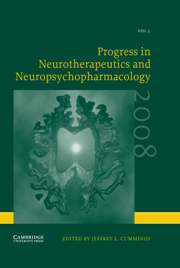No CrossRef data available.
Article contents
Serotonin Related Genes Affect Antidepressant Treatment in Obsessive–Compulsive Disorder
Published online by Cambridge University Press: 12 December 2007
Extract
ABSTRACT
Up to 60% of OCD patients do not respond to a regular serotonin reuptake inhibitor (SRI) treatment. The purpose of the present study was to determine whether polymorphisms of the serotonin transporter (5-HTT), 5-HT1Dβ, and 5-HT2A receptor genes affect the efficacy of SRI treatment in OCD. Ninety-one outpatients with primary OCD according to DSM-IV criteria consented to the study were randomly assigned a 12-week, double-blind trial to receive dosages titrated upward to 300 mg/day of venlafaxine, or 60 mg/day of paroxetine. Primary efficacy was assessed by the change from baseline on the Yale-Brown obsessive–compulsive scale (Y-BOCS), and response was defined as a ≥25% reduction on the Y-BOCS. All of the paroxetine treated patients, with the G/G genotype of the 5-HT2A polymorphism were responders (χ2 = 8.66, df = 2, p = 0.013). In the venlafaxine treated patients, the majority of responders carried the S/L genotype of the 5-HTTLPR polymorphism (χ2 = 9.71, df = 2, p = 0.008). The small group of patients who both carried the S/L genotype of the 5-HTTLPR polymorphism and the G/G genotype of the 5-HT2A polymorphism responded all to treatment.
The results of this study suggest that the response in paroxetine and in venlafaxine treated OCD patients is associated with the G/G genotype of the 5-HT2A polymorphism and with the S/L genotype of the 5-HTTLPR polymorphism, respectively.
Keywords
- Type
- Research Article
- Information
- Progress in Neurotherapeutics and Neuropsychopharmacology , Volume 3 , Issue 1 , January 2008 , pp. 227 - 240
- Copyright
- © 2008 Cambridge University Press


